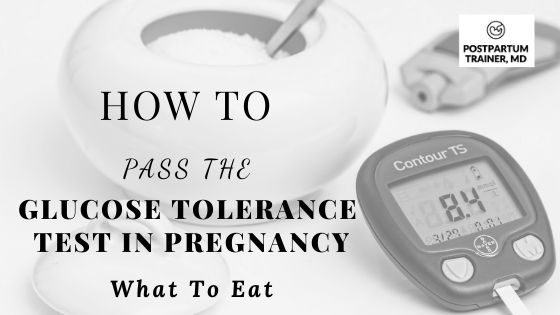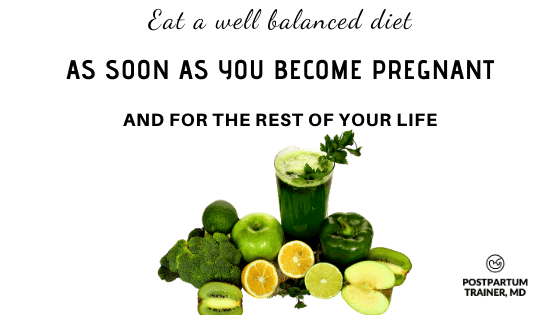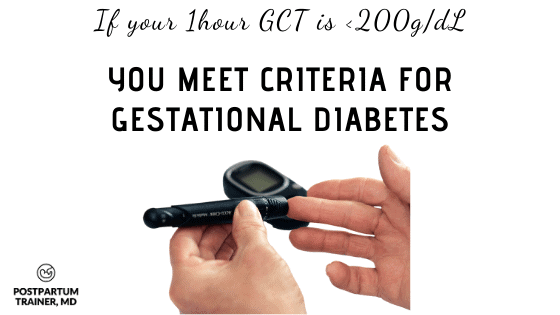So you’re 24+ weeks, and you were told to take the glucose test.
If you’re anxious, you’re not alone.
After reading this post, you’re going to learn how to pass the glucose tolerance test in pregnancy.
Specifically, you’ll learn:
- How to prepare for the 1 hour test, (and pass the 3 hour test if need be),
- What you should eat before taking the glucose test, and
- What happens if you fail the 3 hour test.
Let’s get started.

How To Pass The 1 Hour Glucose Challenge Test When Pregnant
Unfortunately, there is nothing special you can do right before the 1-hour glucose test to make sure that you pass.
However, there are three things you can do to help your body process sugar (if you start early enough).
1. The best thing you can do is eat a well-balanced diet for the months leading up to the test!
Note that I said months.
You cannot pass the 1-hour test simply by changing your diet the day or the week before your test.
Eat a well-balanced diet as soon as you become pregnant (and stick to it for the remainder of your pregnancy!)
A well-balanced diet is rich in fruits, vegetables, whole grains, healthy fats, and protein.

2. The second thing you should do is avoid eating simple carbohydrates during your pregnancy
Simple carbohydrates are foods that tend to cause large spikes in your blood sugar levels.
Exposing your baby to these high blood sugar levels can cause a lot of fetal complications.
So which foods should you avoid?
The ones that have a high glycemic index. See below for specific examples.
3. The third thing you need to do is to try and get adequate sleep for the majority of your pregnancy
I love sleep :).
It is so important for so many things. Including your sugar levels.
Let me explain a little further.
Sleep deprivation is a highly stressful situation for your body.
High stress = high epinephrine and high cortisol levels.
These hormones can increase insulin resistance and increase the available amount of sugar in your blood.
In other words, a lack of sleep can impact how your body metabolizes sugar.
There is growing evidence that sleep loss and diabetes are related.
What Not To Eat The Night Before A Glucose Test
Here is a list of foods not to eat before your glucose test.
If your glucose challenge test is tomorrow, it is a good idea to avoid high glycemic foods for at least 8 hours before the glucose test.
These foods include
- White rice
- White bread
- Baked goods with White flour
- White potatoes
- Soda
- Juice
- Any other sugary drink
- Breakfast cereal
All of these will spike your glucose levels high.
Instead, go for whole grains that contain complex carbohydrates, such as steel-cut oats, brown rice, sweet potatoes, and leafy green vegetables.
How To Pass The 3 Hour Glucose Tolerance Test
Just like the 1 hour glucose test, there isn’t any special way to ensure that you pass the 3 hour oral glucose tolerance test aka the ogtt.
Your best bet is to eat a well-balanced diet leading up to the test and minimize the consumption of simple carbs like cereal, white flour, juice, and soda.
Making these changes the night before or the week before is unlikely to make a big difference. You should make these changes months in advance.
It’s also a good idea to try and maintain these habits postpartum as well. Unfortunately, 60% of women with gestational diabetes will develop Type 2 diabetes later in life.
What Is The Difference Between The 1 Hour Challenge and the 3 Hour oral Glucose Tolerance Test?
The 1-hour test only requires one blood sample after drinking 50 grams of glucose, whereas the 3-hour test requires a fasting blood draw, and 3 additional blood draws after drinking 100 grams of glucose.
The 1-hour test is a screening test, while the 3-hour test is a confirmatory test.
If you test positive on the 1-hour screening test, you will then be asked to undergo the 3-hour confirmatory glucose tolerance test.
Why Do You Take A Glucose Test In Pregnancy?
The glucose test is basically a simple way to determine how your body processes sugar in the third trimester of pregnancy.
In other words, it is a screening test to look for gestational diabetes mellitus.
You will be asked to drink a solution that contains a certain amount of glucose and have your blood drawn 1 or 2 hours later at your doctor’s office.
The glucose challenge test can be done between 24-28 weeks of pregnancy, which is about 6 months.
If you fail, you will then need to perform the glucose tolerance test.
The American College of OBGYN and the American Diabetes Association recommends that ALL pregnant women be screened for gestational diabetes. If you are at high risk, you will be screened twice- once in the first trimester, and again in the third trimester.
Risk factors for gestational diabetes include:
- Obesity
- Have a strong family history of diabetes
- Prediabetes
- If you’ve had gestational diabetes in a prior pregnancy
- High blood pressure
- Polycystic ovary syndrome
Can You Decline The Glucose Test In Pregnancy?
If you decline the glucose test, then we will need to check your blood sugar levels 4 times per day for at least 1 week.
This will require you to prick your finger when you wake up every morning and one hour after breakfast, lunch, & dinner.
This is an alternative way to screen for gestational diabetes.
How Common Is it To Fail The 1 Hour Glucose Challenge Test?
In general, anywhere from 15-25% of women will fail the glucose challenge test. But keep in mind that failing the 1-hour test does not give you the diagnosis of gestational diabetes.
Only about 20% of women who fail the screening test (with a score of 135-143) will actually have the condition.

According to the CDC, the prevalence of gestational diabetes is about 2-10%.
But failing the test should raise some red flags that you need to pay attention to your diet.
How Do I Prepare For My 1 Hour Glucose Test?
You shouldn’t make any drastic changes to prepare for the 1 hour glucose test.
In fact, it’s best that you follow your normal diet because it’s important to get an accurate representation of how your body handles sugar on a day to day basis.
Otherwise, try and get a good night’s sleep the week before the test.
Sleep deprivation can increase cortisol levels, which can also affect your blood sugar levels.
Do I Need To Be Fasting For The Pregnancy Glucose Test?
You do not need to be fasting for the traditional 1 hour test.
However, there is a 2 hour 75-gram glucose test that can be done.
For the 75-gram oral glucose tolerance test, you need to be fasting, and you have to have your blood sugar level taken three times.
The first blood test will look at your fasting glucose, then you will get two more blood tests done. Once after an hour, and again after 2 hours.
Most OBGYN providers use the 1-hour test.
What Is The Normal Range For the 1 Hour Glucose Test?
A normal test result for the 1 hour 50-gram glucose test is lower than 140 mg/dL.
- Some clinics will use a lower threshold of 130 mg/dL. This lower level is used if the population is at increased risk of gestational diabetes.
If you happen to have a value greater than 200 mg/dL, then you meet the criteria for the diagnosis of gestational diabetes.

If you take the 2-hour 75g challenge, a normal result is less than 180 mg/dL at the 1-hour mark, and less than 155 mg/dL at the 2-hour mark
In addition, your fasting blood glucose level should be lower than 95 mg/dL for the 2-hour test.
What If I Fail The 1 Hour Test?
The 1-hour test is just a screening test! If you fail the 1 hour 50-gram test, you will then need to take a 3 hour 100-gram glucose tolerance test.
This test is much more involved and will be scheduled in about 1 week after your screening glucose challenge test.
Is There Anyway To Cheat A Fasting Blood Sugar Test?
There is no way to cheat the test. You won’t be able to manipulate the way your body processes sugar unless you have access to specific medications.
I won’t go into any more details because YOU SHOULD NOT try to cheat the glucose pregnancy test.
This test is really important if you care about the health of your pregnancy and baby.
We need to be able to see how you’re body processes sugar.
If you have gestational diabetes and try to falsify your results, you will increase
- the risk of your baby having birth defects
- the risk of your baby being extremely large and not being able to pass through your pelvis
- the risk of developing preeclampsia
- the risk of having a c-section
- your risk of developing Type II Diabetes and heart disease later in life
- And so much more

So get tested and do it right!
What Happens If You Fail The 3 Hour Glucose Test?
If you fail the 3-hour glucose test, you have impaired glucose tolerance and you will be diagnosed with gestational diabetes.
A failing score is considered when you have 2 or more values in these ranges:
- Fasting > 95mg/dL
- 1 Hour > 180 mg/dL
- 2 Hour > 155 mg/dL
- 3 Hour > 140 mg/dL
This is a very serious condition that requires very close monitoring of your blood sugar levels every single day.
If you don’t, you are putting your own life and your baby’s life at risk.
You will meet with a nutritionist to learn how to improve your diet, and you will have to check your finger stick blood glucose 4 times a day for the remainder of the pregnancy.
What Are The Warning Signs of Gestational Diabetes?
Unfortunately, gestational diabetes is often silent. This means that you may not see warning signs or symptoms of the disease. That is why we screen every single pregnant woman, regardless of risk factors.
A high amount of weight gain during pregnancy may be one of the only signs you can see.
Other Related Questions
What Does the Glucose Drink Taste Like?
The oral glucose test will be very sweet and have a fruity flavor. It usually comes in orange or fruit punch flavors.
Can I Eat Before The Glucose Test?
You can eat before the 1 hour 50 gram test. You should not eat before the 3 hour 100 gram test.
What Should I Eat Before The Glucose Screening Test?
You should eat your normal typical breakfast. This is so that we can get a very accurate representation of how your body handles sugar at this point in your pregnancy, even after your normal breakfast.
With that said, it’s probably a good idea to not consume high glycemic foods right before, especially sugary drinks like juices, smoothies, and sodas.
What Should I Eat The Night Before A 3 Hour Glucose Test?
You shouldn’t eat anything special the night before a 3 hour test. It is best to eat what you would normally eat.
Ideally, you should have been eating a well-balanced, healthy diet full of complex carbohydrates, protein, and healthy fats for the months leading up to this test.
Can You Walk Around During The Glucose Tolerance or Challenge Test?
Yes, you can walk around during the glucose test. A normal amount of walking shouldn’t impact the test results.
With that said, don’t go for a run or do 200 squats and push-ups, as this can make the results unreliable :).
Can You Drink Water During The 3 Hour Glucose Test?
Yes, you can drink water during the 3-hour glucose tolerance test. 3 hours is a long time not eating or drinking anything, especially if you were already fasting for at least 8 hours first.
But DO NOT eat or drink anything else. Otherwise, your blood sugar levels will be even higher.
Is There An Alternative Way To Test For Gestational Diabetes?
Yes. If you do not want to drink the glucose solution for one reason or another, there is another way we can test you for gestational diabetes.
It would involve you actually checking your blood glucose through finger sticks four times a day for an entire week. This will give us a good idea of how your body processes the foods you eat.
Again, don’t try to manipulate this test in any way. For example, don’t try to eat really healthy for that week, then go back to eating your normal diet the subsequent week.
Just to be safe, your health care provider may have you check your finger sticks for 2 or more additional weeks just in case.
Final Thoughts On Glucose Screening
The glucose test in pregnancy is an easy way to check your body’s ability to tolerate sugar.
There’s no way to cheat this test, and you should prepare for it by eating a well-balanced diet as soon as you find out you’re pregnant.
If you fail the test, make sure that you follow up very closely with your doctor to try and prevent the development of type 2 diabetes mellitus.
Now I want to hear from you.
Did you fail your glucose test?
What did you do to prepare for it?
Comment below and let me know!
Related Posts to Staying Fit During Your Pregnancy
References:
- Knutson KL. Impact of sleep and sleep loss on glucose homeostasis and appetite regulation. Sleep Med Clin. 2007;2(2):187-197. doi:10.1016/j.jsmc.2007.03.004
- Tita ATN, Lai Y, Landon MB, et al. Predictive Characteristics of Elevated 1-Hour Glucose Challenge Test Results for Gestational Diabetes. Am J Perinatol. 2017;34(14):1464-1469. doi:10.1055/s-0037-1604243
- Noctor E, Dunne FP. Type 2 diabetes after gestational diabetes: The influence of changing diagnostic criteria. World J Diabetes. 2015;6(2):234-244. doi:10.4239/wjd.v6.i2.234
Get Four Free Workouts To Help Strengthen Your Pelvic Floor & Heal Your Mommy Tummy!

Brittany Robles, MD, MPH, CPT
Brittany Robles is a full-time OBGYN physician, a NASM certified trainer, and a prenatal and postnatal fitness specialist. She holds a Master of Public Health degree in maternal health with a special interest in exercise and nutrition. She is also the co-author of The White Coat Trainer. Learn more about her here.
Sharing is Caring – Send This To A Mom In Need!

I just failed my 1 hour glucose challenge at 28 weeks, second pregnancy. Had eggs, coffee with cream, and wheat toast with butter for breakfast. I did have a few sips of Sprite the night before to quell nausea. Very upset but not shocked because I have not been eating as well as I could be due to stress. First pregnancy, I passed the challenge and did not gain much weight. This time I have gained too much too fast and my belly is gigantic for my 5 ft 97lb (pre-pregnancy) frame. Trying not to beat myself up over it and fingers crossed I pass the 2 hour test next week.
Hi Amanda!
Thank you so much for your comment.
I am sorry to hear you failed your 1hr GCT.
As you know each pregnancy is different so don’t beat yourself up over it.
Try to keep yourself hydrated, eat a well-balanced diet, and stay positive.
Good luck next week with the 2hr test!
I failed my 1 hour glucose test at 25 weeks – with a level of 159 mg/dL. I had a whole wheat english muffin with butter and jam and a banana for breakfast, and a cup of coffee with coconut creamer. For dinner the night before I had barley soup with beans and vegetables, and an apple for dessert. I’m surprised and pretty upset, as I’m very active, was 120lbs at 5’8″ pre-pregnancy, and am now around 135lbs, which I think is in the normal range. I admit I haven’t been eating as healthy during my pregnancy as I normally do, as I’ve been craving juice in the mornings, and have replaced my daily glass of wine with soda (well maybe not every day, but I hardly ever drank soda before my pregnancy). So perhaps that has contributed to not passing the test, and also the fact that I’m almost 40. I go for my 3-hour test next week which I’m dreading as I hate needles!
Hi Ariane,
Thank you so much for the comment.
I’m so sorry to hear you failed your GCT.
It seems you have already identified the problem areas- not eating as healthy as you normally do, drinking juice in the am, and drinking soda.
Also, don’t forget there may be a genetic component to developing gestational diabetes.
Try to do the best you can and remember every pregnancy is different!
Good luck with the 3hr GTT!
I failed my 1 hour only by 5 points. I’m very disappointed. I go for the 3 hour test next week… I’m taking carbs out my diet at this point. I had no breakfast as my text was in the morning. 😒
Hi Amanda,
Thank you so much for your comment.
I am so sorry you failed your GCT! I know that could be disappointing but let’s see what happens at your GTT next week!
One important thing that I think this article could put more emphasis on is that if you are diagnosed with gestational diabetes, not to beat yourself up. You can be fit, healthy, eat a proper diet and STILL develop GDM. It’s just your body’s way of reacting to the pregnancy. You will not necessarily get type 2 diabetes later in life and it’s not your fault because you ate a donut. Some people are just going to fail, the same way you have other pregnancy complications for no obvious reason.
I have had it during 2 of my pregnancies and took it very hard the first time, having always been a very health conscious person and not gaining much weight. Go easy on yourself.
Hi Kelly,
Thank you so much for this comment.
These are all great points you mentioned and I appreciate you adding to the conversation!!
I failed my 1 hour glucose test by almost 20 points! I was shocked because I have only gained about 5 pounds compared to pre-pregnancy (I am @ 118 pounds) right now. I have not had any of the “warning signs” of gestational diabetes such as polyuria/poly dypsia and so on….. My diet is very balanced and I don’t drink any juices/sodas and simple carbohydrates. I incorporate lots of nuts/yogurt/veggies in my daily diet and I walk about 6 miles daily. So I am puzzled of how/why I failed my glucose test. I will get my 3 hour test done next week but as you mentioned in your piece above is that “failing the 1 hour glucose test should be a wakeup call” and I am worried that if I even pass the 3 hour test, I need to be on the watchout basically for future but since I believe I am hitting all the main points as being active and eating healthy, I have no idea what else I can do?!!!
Hi Sara,
Thank you so much for your comment.
I am sorry to hear you failed your 1hr GCT. Everyone’s body processes sugar differently in pregnancy. It seems you are doing everything you can to maintain a healthy diet and lifestyle. Try to see if your OBGYN has a dietician/nutritionist that can sit down with your to ensure there is anything else you can do.
Hope this helps!